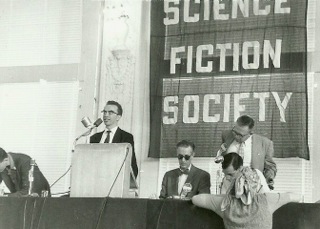
NyCon II (1956). Chair Dave Kyle, seated, wearing a bow tie and dark glasses; Larry Shaw at podium, John Campbell and Robert Silverberg to Kyle’s left.
This month fanhistorians were turned on their ears when a previously unknown shortlist of 1956 Hugo nominees came to light — unknown, despite the fact that it had been hiding in plain sight for over sixty years.
As the official Hugo Award site explained when they updated the entry for 1956 –
We thank Olav Rokne for bringing to our attention an article on page 15 of the 1956 Worldcon Progress Report 3 that included the names of the finalists along with voting instructions.
Yes, the information was in the Worldcon’s own publication. It doesn’t make sense that experienced fanhistorians were unaware of it, however, I think I’ve figured out why that happened.
First, until just a few years ago when Kim Huett started acquiring early Worldcon progress reports and making scans available through Fanac.org, few fans were in a position to consult the source material.
Second, by the time digital copies arrived online, longtime fans had no motive for checking on what seemed a settled question. Multiple fanhistories written by fans who had been active in the 1950s agreed that Detention, the 1959 Worldcon, was the first to institute a nominating ballot. Indeed, that remains true in a literal sense – it was the first use of a formal two-step process — but as we’re now aware NYcon II (1956) was the first Worldcon to issue a ballot containing a shortlist of finalists.
The authoritative A History of the Hugo, Nebula, and International Fantasy Awards (1971, 1976) compiled by Don Franson and Howard DeVore opens with an emphatic statement on this score —
In answer to the question “what and who were nominated for a Hugo?” the entire history of the awards themselves must be taken into account. For one thing, the first Hugo Award winners were not nominated….
However, before 1959, there were no nominating ballots (or if you prefer there was only a nominating ballot – there was only one ballot sent out.) Thus, there were no nominations to list here until the Detention in 1959.
Both Franson and DeVore were early fans reporting with the credibility of lived experience. So was Harry Warner, Jr. when he wrote in A Wealth of Fable —
The later year system of preliminary balloting to determine nominees followed by final voting didn’t exist until the Detention in 1959. One reason for the changeover was the apathy which the Hugo attracted during those early years. Not many people were voting, and there were many possible choices in the years without the nomination system.
Warner’s rationale for the change helps foster the impression that Hugo shortlists originated in 1959 by making no reference to the process followed by the 1956 committee, although he is literally correct that the two-step voting system was used for the first time in 1959.
So where did the 1956 shortlist come from?
NyCon II’s Progress Report 3 says on page 15:
All nominations were screened by a special committee in consultation with experts in the field to determine their qualifications… Those chosen represent the names with considerable support.
These days we would call that a juried shortlist.
Notwithstanding the shortlist, fans in 1956 were still allowed to vote for whatever they wanted:
Your ballot contains the name of each nominee with a box in the front. Either check or blacken in each box before the name of your choice. If you wish to write in the name of your choice which is not listed, do so on the black lines provided for you.
In contrast, the 1959 Hugo ballot explicitly disallowed write-in votes.
Franson, DeVore and Warner all passed from the scene years ago, so we may never find out why they all neglected to report the 1956 shortlist. The opening paragraphs of Franson and DeVore’s History stress that the Hugos are a popularly-voted award, unlike the International Fantasy Award, whose winners are also reported in the book. They may have considered a committee-created shortlist unworthy of canon. But that’s pure speculation.
The one thing we’ve learned for certain is that there was a gap in the fanhistories people depended on for the past few decades. That’s why I’m happy to know someone is looking at the origins of the Hugo Award with a fresh set of eyes.
